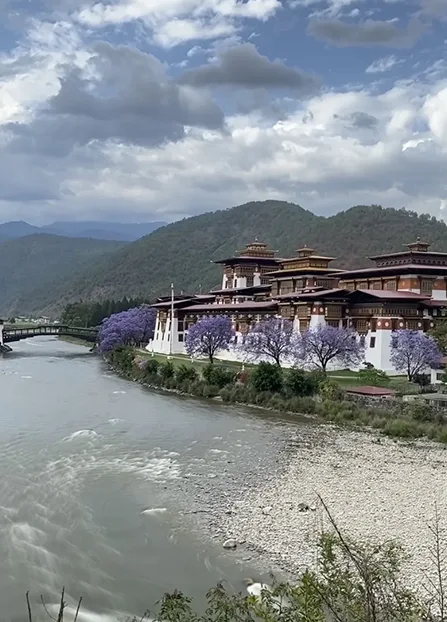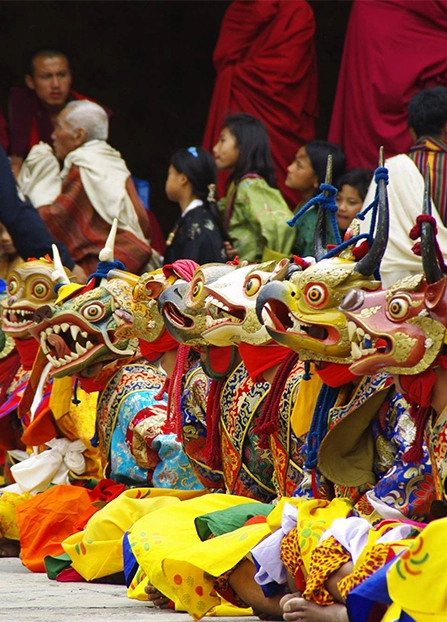Punakha FESTIVAL




Punakha Festival (Drubchen & Tshechu)
The Seven-day event of ‘Drubchen’ and ‘Tshechu’ is held from 5th to 12th of the First Month of the Bhutanese Calendar every year.
The Dharma King, who is the re-incarnation of Avaloketeswara;
He, who is known as the protector of the Medicinal Land of Four Directions;
He, who is the supreme head of Peldhen Drukpa;
Let us hold aloft the Victory Banner of the one who subdued the enemies of Peldhen Drukpa from all the directions.
Introduction
Looking like an anchored ship, the Punthang Dechen Phodrang or Punakha Dzong stands in the middle of the Phochu (Male) and Mochu (Female) Rivers. It was built by Zhabdrung Ngawang Namgyal in 1637, a culmination of the prophecy made by Guru Rimpochhe in the 8th century. The name Pungthang Dechen Phodrang means ‘Palace of Great Bliss.’
The Dzong carries a very rich history of Bhutan in that it was here the Zhabdrung, the founder of united Bhutan, passed away in 1651 and also it was in this Dzong that Ugyen Wangchuck, Bhutan’s first hereditary king was crowned in 1907. Then too as the first capital of Bhutan, the first session of the National Assembly was also held there in 1953.
But more than anything else, Punakha Dzong is remembered in the history of Bhutan as one having withstood two major attacks made by the Tibetans. The first came in 1639 when the Tibetans with the support of the group of five Lamas attacked the dzong. The next came in 1644 launched by the 5th Dalai Lama. In both of these battles, the Tibetans were utterly defeated and their weapons and armour captured.
The Puna Drubchen is then an annual festival introduced by Zhabdrung to commemorate the victories over the Tibetans. During the festival, the ‘pazaps’ or local militia men, dressed in battle gear showcase a battle scene of this distant past recalling the days when in the absence of a standing army, men from the eight Tshogchens or great village blocks of Thimpu came forward and managed to expel the Tibetan forces out of the country ushering in a new-found internal peace and stability.
As for the Punakha Tshechu, it was started by the 70th Je Khenpo Trulku Jigme Choedra and the then Home Minister His Excellency Lyonpo Jigme Yoedzer Thinley in 2005 on the request made by Punakha District Administration and people for upholding the Buddhist teachings and keeping alive the noble deeds of Zhabdrung Rimpochhe.
Purpose
a) Bhutan is a country with a strong Buddhist foundation. It is a sovereign independent country and one that is rich in age-old customs and traditions. It is essential that these unique identities of the country are preserved and passed on to our future generations and the Tshechus and Drubchens are the best possible means to carry them forward by way of sound and vision.
b) The Tshechus and Drubchens are also held annually to help in preserving the grand customs and traditions started by our forebears and to alternatively bring enjoyment to people.
c) The Tshechus and Drubchens are held on auspicious days. Such events create an opportunity to bring people together in common celebrations and fostering relationships.
d) A plan is ahead to make the Punakha Tshechu different from other tshechus. The plan is to make the Tshechu not only attractive for its events but as a place and time for prayer and pilgrimage for devout Buddhists.
e) It will be also made special in the eyes and hearts of tourists who visit Bhutan as an event that reflects the richness of everything that is Bhutanese.